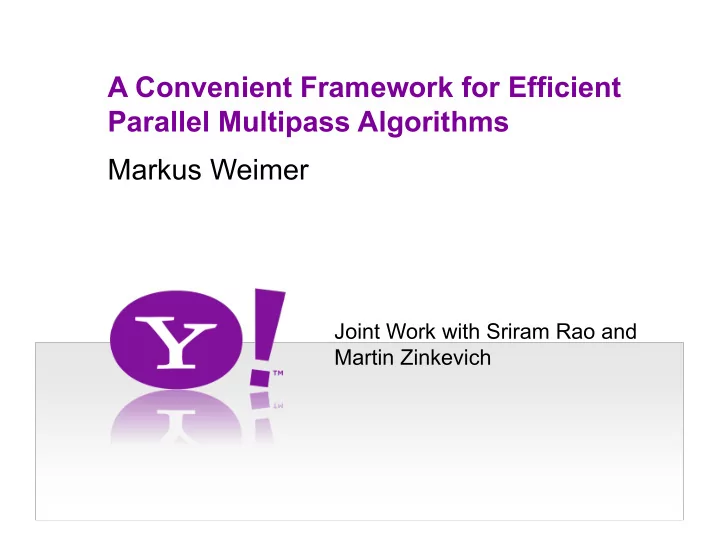

A Convenient Framework for Efficient Parallel Multipass Algorithms Markus Weimer Joint Work with Sriram Rao and Martin Zinkevich
Intro / Point of view taken ML is data compression: from large training data to a small model We typically iterate over the training data The state shared between iterations is relatively small O(model) Many algorithms can be expressed as data-parallel loops with synchronization 2 12/11/10
In MapReduce Pass Result Overhead per Iteration: Data (each pass) • Job setup • Data Loading • Disk I/O 3 12/11/10
Worker/Aggregator Advantages: Final Result Initial Data • Schedule once per Job • Data stays in memory • P2P communication 4 12/11/10
Worker 1. Load data 2. Iterate: 1. Iterates over data 2. Communicates state 3. Waits for input state of next pass 5 12/11/10
Worker 1. Load data 2. Iterate: 1. Iterates over data user supplied function 2. Communicates state 3. Waits for input state of next pass 6 12/11/10
Aggregator Receive state from the workers Aggregate state Send state to all workers Yahoo! Presentation, Confidential 7 12/11/10
Aggregator Receive state from the workers Aggregate state user supplied Send state to all workers Yahoo! Presentation, Confidential 8 12/11/10
Failure Handling in the Framework Worker › Meh (SGD) › Restart on different machine (else) Aggregator › Restart on different machine › Re-request data from workers 9 12/11/10
Experiments: Parallel Stochastic Gradient Descent Work() Stochastic Gradient Descent pass Aggregate() Average Models 10 12/11/10
Does it work? – Objective over #Passes 0.8 Parallel eta=0.8 0.7 Sequential, eta=0.1 0.6 Sequential, eta=0.8 0.5 Parallel, eta=6.4 0.4 0.3 0.2 0.1 0 1 11 21 31 41 51 61 71 81 91 11 12/11/10
Is it fast? – Time per pass (8 machines) 1.00 0.45 0.06 0.03 0.03 Sequential MapReduce W/A 10 Passes W/A 100 Passes W/A Limit 12 12/11/10
markus weimer Yahoo! Labs weimer@yahoo-inc.com 13
Recommend
More recommend